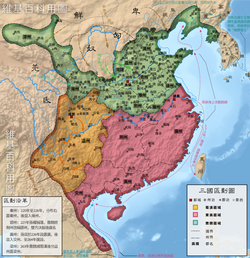Shu Han
| Shu Han | ||||||||||
| 蜀漢 | ||||||||||
|
||||||||||
|
The territories of Shu Han (in orange), 262.
|
||||||||||
| Capital | Chengdu | |||||||||
| Languages | Ba-Shu Chinese | |||||||||
| Religion | Taoism, Confucianism, Chinese folk religion | |||||||||
| Government | Monarchy | |||||||||
| Emperor | ||||||||||
| • | 221–223 | Liu Bei | ||||||||
| • | 223–263 | Liu Shan | ||||||||
| Historical era | Three Kingdoms | |||||||||
| • | Established | 221 | ||||||||
| • | Conquest of Shu by Wei | 263 | ||||||||
| Population | ||||||||||
| • | 221 est. | 900,000 | ||||||||
| • | 263 est. | 1,082,000 | ||||||||
| Currency | Chinese coin, Chinese cash | |||||||||
|
||||||||||
| Today part of |
|
|||||||||
| Shu Han | |||||||||||||
| Traditional Chinese | 蜀漢 | ||||||||||||
|---|---|---|---|---|---|---|---|---|---|---|---|---|---|
| Simplified Chinese | 蜀汉 | ||||||||||||
|
|||||||||||||
| Transcriptions | |
|---|---|
| Standard Mandarin | |
| Hanyu Pinyin | Shǔ Hàn |
| Wade–Giles | Shu Han |
| Yue: Cantonese | |
| Jyutping | Suk6 Hon3 |
Shu or Shu Han (221–263) was one of the three major states that competed for supremacy over China in the Three Kingdoms period (220–280). The state was based in the area around present-day Sichuan and Chongqing, which was historically known as "Shu" after an earlier state in Sichuan named Shu. Shu Han's founder Liu Bei had named his state "Han" as he considered it the legitimate successor to the Han dynasty, while "Shu" is added to the name as a geographical prefix to differentiate it from the many "Han" states throughout Chinese history.
Towards the end of the Eastern Han dynasty, Liu Bei, a warlord and distant relative of the Han imperial clan, rallied the support of many capable followers. Following the counsel of his advisor, Zhuge Liang, and Zhuge's Longzhong Plan, Liu Bei conquered parts of Jing Province (covering present-day Hubei and Hunan) in 208 and 209. Liu Bei took over Yi Province (covering present-day Sichuan and Chongqing) from the warlord Liu Zhang between 212 and 215 and wrestled control of Hanzhong from his rival Cao Cao in 219.
From the territories he gained, Liu Bei established a position for himself in China during the final years of the Han dynasty. However, in 219, the alliance between Liu Bei and his ally, Sun Quan, was broken when Sun sent his general Lü Meng to invade Jing Province. Liu Bei lost his territories in Jing Province to Sun Quan. Guan Yu, the general guarding Liu Bei's assets in Jing Province, was captured and executed by Sun Quan's forces.
...
Wikipedia

